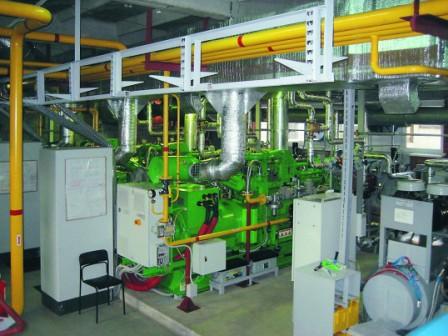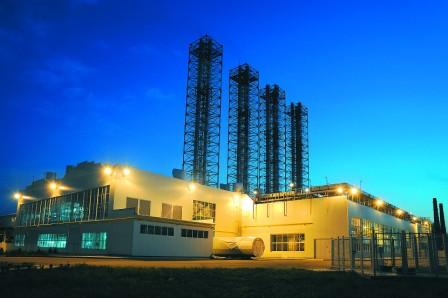Новости
 The first power unit was commissioned in 2008. It consists of three JMS 420 GS-N.LC gas engine power plants, one waste-heat boiler. The second unit was designed around JMS 420 GS-N.LC and one WHB. Electric output of JMS 420 GS-N.LC is 1400 kW. It is equipped with AVK electric generator with voltage of 10.5 kV. Main power equipment was delivered by Filter company, the project was developed by Vera JSC. The main fuel for the station is natural gas. The first power unit was commissioned in 2008. It consists of three JMS 420 GS-N.LC gas engine power plants, one waste-heat boiler. The second unit was designed around JMS 420 GS-N.LC and one WHB. Electric output of JMS 420 GS-N.LC is 1400 kW. It is equipped with AVK electric generator with voltage of 10.5 kV. Main power equipment was delivered by Filter company, the project was developed by Vera JSC. The main fuel for the station is natural gas.
Steam waste-heat boilers were supplied by Vapor (Finland). Their steam output is 690 kg/h, pressure – 0.6 MPa. They are equipped with Honeywell control system. The station also includes absorption chiller for cold water production.
 Power station was constructed on the site of Materia Media Holding enterprise. Power equipment was supplied by Intma, which is official distributor of GE Energy Jenbacher gas engines in Uralsky region. Power station was constructed on the site of Materia Media Holding enterprise. Power equipment was supplied by Intma, which is official distributor of GE Energy Jenbacher gas engines in Uralsky region.
In 2008 two JMS 208 GS-N.LC. gas power plants were commissioned on the site. JMS 208 GS-N.LC. rated at 330 kW has thermal output of 360 kW, electric efficiency 38.8 %, thermal – 42.6 %. At present total electric output of the station was increased up to 990 kW. The delivery and commissioning of the equipment was carried out under turn-key contract.
Under the contract Intma also carried out all civil, construction and commisioning works. All power and auxiliary equipment was manufactured by GE Energy Jenbacher gas engines on its industrial facilities in Jenbach, Austria.
 Up-to-date gas engine power station started operation in Tiraspol. Automotors DP supplied six MWM TCG 2032 V 16 power plants for the station. Total electric output of the station is 24 MW, thermal output is 24 MW. The plants operate on natural gas in parallel with main power grid. General designer of the project is Rassvet-Energo NPO, construction, installation and commissioning were carried out by Tirotex JSC. The main textile factory in the region is carring out the modernization of all technological processes. Up-to-date gas engine power station started operation in Tiraspol. Automotors DP supplied six MWM TCG 2032 V 16 power plants for the station. Total electric output of the station is 24 MW, thermal output is 24 MW. The plants operate on natural gas in parallel with main power grid. General designer of the project is Rassvet-Energo NPO, construction, installation and commissioning were carried out by Tirotex JSC. The main textile factory in the region is carring out the modernization of all technological processes.
The customer is Dinyolneft which is engineering the Northern group of oil and gas fields.
Power equipment for the project was supplied and commissioned by Mamins Volga Diesel Plant JSC (VDM) on Vostochno-Vozeyskoye oil field.
The station was designed around Caterpillar G3516 gas engine rated at 1070 kW, electric generator SR4B with voltage of 0.4 kV. It is equipped with ComAp controller (second level of automation). The station operates as a part of local power grid on casing-head gas.
The specialists of Mamins Volga Diesel Plant modernized control systems of two Cummins 656DFGD diesel power plants each rated at 660 kW. They were commissioned on the field earlier.
The REpower MM92 turbines, each with a rated power of 2.05 megawatts (MW) and a hub height of 80 meters, are destined for one of EverPower’s development projects located across the US states of New York, Ohio, Pennsylvania and Washington. EverPower has advanced stage projects totaling more than 600 MW of capacity targeted for construction over the next three years.
The 25 turbines will have a total power output of 51 megawatts. They are to be delivered in summer 2011 and commissioned by the end of the same year. Each turbine produces up to 6.5 million kilowatt hours (kWh) of wind electricity per year. This is the first project between EverPower and the German-based wind turbine manufacturer’s USA subsidiary. In addition to installation and commissioning the turbines, REpower and EverPower have entered into a long term service and maintenance agreement.
Wärtsilä has been awarded an Operations and Maintenance (O&M) contract by the Al Badia Cement JSC for its captive power plant. The plant is located within the company’s cement factory grounds in the Abu Al Shamat area, in Syria. The contract is valid for three years.
The power plant will be the sole source of electrical supply to this new cement works facility, and is currently in the process of being commissioned for operation. It is powered by five Wärtsilä 20V32 and one Wärtsilä 9L32 generating sets, and produces a total output of more than 45 MW. The plant is also fitted with exhaust gas fired boilers for its auxiliary heating system.
Under the terms of the agreement, Wärtsilä will take responsibility for operating and maintaining the power plant so that it runs cost-effectively and with optimal efficiency. In this way the customer is able to focus entirely on the company’s core business of producing 1.60 million tons of cement annually in the first line.
From 16 to 19 November, at the BioEnergy Decentral exhibition in Hanover, Tognum subsidiary MTU Onsite Energy GmbH Gas Power Systems was showcasing electric power generation sets and combined heat and power (CHP) modules with the new Series 4000 biogas engines for the first time. With an electrical output of up to 2MW, these units complete the biogas product portfolio at the top end of the range.
These more powerful engines mean that operators of larger biogas plants can achieve even greater cost efficiency because, among other benefits, service and maintenance costs can be reduced in comparison with plants based on smaller engines and because superior power density reduces space requirements. Market introduction of biogas power generation plants based on 8, 12, 16 and 20-cylinder engines covering an output range from around 770kW to 2,000kW will take place in stages from March 2011. In addition, plants based on CHP modules provide access to an extra 2.6MW of thermal energy. Plans are also underway to introduce other versions during the course of next year. These include sewage and landfill gas with other versions for special gases scheduled for later.
|
 The first power unit was commissioned in 2008. It consists of three JMS 420 GS-N.LC gas engine power plants, one waste-heat boiler. The second unit was designed around JMS 420 GS-N.LC and one WHB. Electric output of JMS 420 GS-N.LC is 1400 kW. It is equipped with AVK electric generator with voltage of 10.5 kV. Main power equipment was delivered by Filter company, the project was developed by Vera JSC. The main fuel for the station is natural gas.
The first power unit was commissioned in 2008. It consists of three JMS 420 GS-N.LC gas engine power plants, one waste-heat boiler. The second unit was designed around JMS 420 GS-N.LC and one WHB. Electric output of JMS 420 GS-N.LC is 1400 kW. It is equipped with AVK electric generator with voltage of 10.5 kV. Main power equipment was delivered by Filter company, the project was developed by Vera JSC. The main fuel for the station is natural gas.
 Power station was constructed on the site of Materia Media Holding enterprise. Power equipment was supplied by Intma, which is official distributor of
Power station was constructed on the site of Materia Media Holding enterprise. Power equipment was supplied by Intma, which is official distributor of  Up-to-date gas engine power station started operation in Tiraspol.
Up-to-date gas engine power station started operation in Tiraspol. 